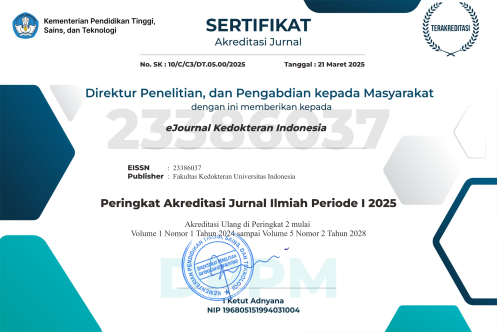Exercise-Enhanced Neurogenesis: A Potential Remedy for Malnourished Rat Brains
DOI:
https://doi.org/10.23886/ejki.12.657.238Keywords:
Exercise, FNDC5, Malnutrition, NeurogenesisAbstract
Physical exercise has gained attention as a prospective intervention, leveraging its established capacity to augment brain function and cognition through neurogenesis and the production of brain-derived neurotrophic factor (BDNF) facilitated by the FNDC5 pathway. This study aims to evaluate Fndc5 gene expression in malnourished rat brains induced by a low-protein diet coupled with exercise intervention to unravel the interplay of nutrition, exercise, and brain function in addressing malnutrition. The research was conducted from June to September 2022. A total of 20 male wistar rats, aged 6 weeks, were categorized into four groups (control, low-protein diet, normal diet with exercise, and low-protein diet with exercise). The intervention spanned 24 weeks with a low-protein diet followed by 16 weeks of moderate-intensity exercise. Brain tissue of wistar rats was collected for brain weight assessment and RNA extraction. The brain weight and Fndc5 mRNA expression were significantly increased in the normal diet and exercise group compared with the control group. The brain weight rose slightly in the low-protein diet plus exercise group compared to the exercise-absent low-protein diet group; however, the difference was not statistically significant (p=0.722). There was no substantial rise in Fndc5 levels in the malnourished rat group subjected to exercise intervention compared to the non-exercising malnourished group (p=0.137). Exercise intervention in the normal diet group can increase brain weight and Fndc5 expression. However, exercise intervention could not increase brain weight and Fndc5 expression in malnutrition model rats.
Downloads
Downloads
Published
How to Cite
Issue
Section
License
Copyright (c) 2025 Adziqa Ammara Qiantori, Putri Teesa Rahdiyanti, Ronny Lesmana, Irma Ruslina Defi, Faysal Kastella, Vita Murniati Tarawan, Hanna Gunawan

This work is licensed under a Creative Commons Attribution-NonCommercial 4.0 International License.
Accepted 2024-12-31
Published 2025-01-15



